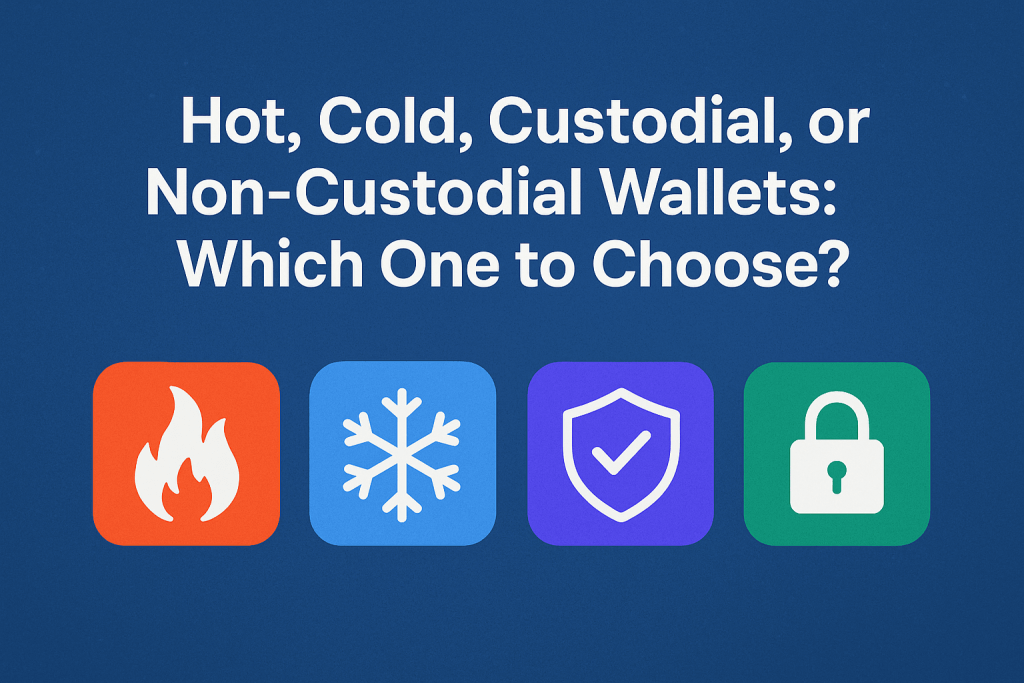Bitcoin represents a whole new class of assets. While stocks and fiat money are stored in bank and management accounts, Bitcoin requires the use of special wallets. These wallets can be hot or cold, non-custodial or custodial, and it is important to know the difference.
If you buy Bitcoin with debit card, it’s likely you’re storing it in hot or custodial wallets. However, for large Bitcoin purchases, cold wallets are more preferred in terms of security.

Key Differences Between Bitcoin Wallets
So, how to choose the best Bitcoin wallet among such a variety of options? Let’s check what sets them apart. Hot and custodial wallets, for example, are easier to operate. Cold and non-custodial wallets, on the other hand, offer an extra layer of security. They’re more useful for long-term holdings, but users have a higher responsibility for keeping the funds secure.
Hot Wallet
These online wallets are a type of software that is always connected to the internet. They’re useful for people who make frequent transactions and need the convenience of accessing their funds at any time.
Hot wallets are one of the most popular choices in the ecosystem. They’re available for mobile devices, as well as desktop and web versions. However, these features make them vulnerable to viruses and other attacks, intended to steal the funds.
Cold Wallet
Cold wallets are hardware devices that aren’t connected to the internet. This helps secure the funds as they’re less likely to be targeted by attackers. However, moving funds from cold wallets to exchanges or other devices can be complicated, so they’re not convenient for everyday use. Instead, they’re better suited for long-term holding.
Paper wallets are another cold alternative. This mechanism consists of keeping the private keys written on paper, but users must be extremely careful to avoid leaking sensitive information or simply not to lose it.
Custodial Wallet
Custodial wallets are a type of Bitcoin storage where a third-party owns the private keys. Private keys are a code that grants access to anyone to the funds in the wallet. In hot and cold wallets, the user owns the keys, but they’re responsible for keeping them safe.
Custodial options like the Paybis Bitcoin wallet save users the responsibility of managing the private keys. It’s a more convenient option for new users or frequent traders. But, it requires users to trust the provider, so you should only use custodial wallets from reputable companies.
Non-Custodial Wallet
Hot or cold storage devices are non-custodial wallets. It means that users are responsible for managing the private keys instead of the convenience offered by custodial options.
In non-custodial wallets, users typically need to write down the seed phrase or private keys on a piece of paper. This way, it’s less likely to fall into the hands of attackers. But if anyone else gains access to this code, they’ll be able to move the funds from the wallet. Non-custodial wallets are more secure, but they require careful management.
Features of Using Each Type of Bitcoin Wallet
Each type of Bitcoin wallet suits a certain purpose for the trader — whether it is long-term storage or frequent transactions. Let’s consider key factors traders are usually interested in the most.
Convenience
In terms of convenience, the clear choices are hot and custodial wallets. They allow users to make transactions faster, either for trading or for making payments. Between these two, custodial wallets stand out. They’re often integrated in exchanges, and users don’t have to worry about security concerns.
That’s the reason why online wallets are the most popular option. Most users appreciate the ability to transact quickly and being able to access more coins.
High Security
When it comes to security, though, cold wallets are the safest bet. As was explained, they are less prone to attacks because they’re not connected to the internet. Besides, hardware wallets often include other security measures, such as MFA.
In fact, centralized exchanges keep most of their funds in cold wallets and only store a small percentage in hot wallets.
Full Control
Non-custodial and cold wallets give full control of one’s funds. While people have the added responsibility of keeping the seed phrase safe, they don’t need to trust the wallet provider.
This is, in fact, one of the core values of Bitcoin, giving people back ownership of their money.
Ease of Use
However, the ease of use of custodial wallets cannot be understated. For beginners in the industry, it can be complicated to remember all the security steps they must take. And mistakes in this regard can be quite expensive.
That’s why custodial options, especially mobile alternatives, can be a better way to start purchasing and storing Bitcoin. Then, as users learn more about the technology and make bigger investments, they can move to other types of wallets.
Make the Right Choice – Get the Best Wallet for Your Crypto
Eventually, the choice depends on what you need and what you value more. If you’re making payments every day, a hot or custodial wallet can be more appropriate. To store your funds for a long time, you’d rather go with a cold wallet.
Many crypto investors keep the majority of their portfolio in a hardware wallet and the small fraction in hot or custodial wallets to use for daily transactions. Whether you prioritize security, control, or convenience, taking the time to find the best crypto wallet for your needs can make all the difference in your Bitcoin journey.

